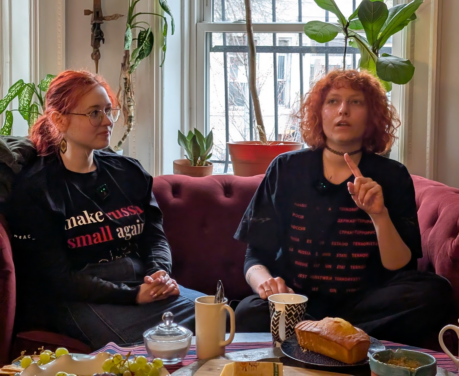During the 69th session of the United Nations Commission on the Status of Women (CSW69), held at UN Headquarters in New York from March 10 to 21, 2025, Tania Vynska and Yana Dotsenko, representatives of the Ukrainian feminist organization Bilkis, participated in discussions focusing on the review of the Beijing Declaration and Platform for Action, originally adopted in 1995. Their official statement regarding the status of women in Ukraine can be found on the CSW69 website.
The logo of Bilkis features the vagina dentata, a symbol connected to a significant mythological figure in Ukrainian culture.

Tania and Yana’s visit was also an opportunity to network with feminists from other countries, NGOs, and potential donors. Dan La Botz from New Politics took advantage of this gathering to learn about their organization.
Origins of Bilkis
NP: Thank you for talking with me to help New Politics readers understand your organization and the situation for women in Ukraine. What inspired the founding of Bilkis?
Yana: We established Bilkis in Kharkiv in 2019 because there were no organizations at that time that resonated with our vision. While there were feminist groups, they lacked a leftist perspective. We aspired to create an organization that could shift societal perceptions about gender.
Core Feminist Values
NP: What were the leftist ideas you deemed essential for a feminist group?
Yana: We aimed to address class issues and highlight the poverty that affects women. Women are among the groups hit hardest by poverty. Many existing NGOs in Ukraine catered to upper- or middle-class environments. Until Russia’s full-scale invasion, there was a focus on helping businesswomen without critiquing systemic economic issues. Recent societal needs shifted some of that focus toward humanitarian aid, but the discourse often remained centered on women’s leadership rather than addressing fundamental inequalities.
Inclusive Approach
NP: What alternatives does Bilkis offer compared to other NGOs?
Tania: Bilkis champions feminism and intersectionality. Our approach involves addressing various forms of discrimination, focusing on marginalized groups such as young girls, women, and LGBTQ+ individuals. We acknowledge that impoverished women often need more assistance than their wealthier counterparts.
Our foundational values are social equity, decoloniality, and horizontality. We stand against all forms of imperialism and advocate for the liberation of colonized peoples, recognizing ongoing economic colonialism and its impacts on consciousness.
Decoloniality and Cultural Dominance
NP: Can you elaborate on your stance regarding decolonization?
Yana: We prefer the term “decoloniality.” While historical conquests and occupations occurred, contemporary economic colonialism persists alongside colonial ideologies. A case in point is Russia’s colonial attitude towards us, especially within cultural domains, where knowing Russian was often a prerequisite for success in the arts in Ukraine. Though dynamics have shifted since the invasion, this mindset has deeply entrenched historical roots.
Tania: Russian culture remains dominant in many areas, leading to the perception of its superiority in our society.
Decision-Making and Projects
NP: What projects or campaigns does Bilkis currently undertake?
Tania: One of our previous initiatives, “space of things,” allowed individuals to donate clothing and items. This project assisted women, children, and those in need to access necessary resources during tough times. We ran it for two years after the war escalated.
Current Initiatives
Tania: Our current work emphasizes educational efforts and social media campaigns concerning feminism, gender, and the inequalities that persist. I also lead our YouTube video essay series titled “Dear Diary,” offering commentary through a queer feminist lens on society, cinema, and culture.
Yana: We host a feminist film club that screens queer or feminist films twice monthly, fostering discussions on social inequalities and representation in media. Additionally, we run the 16 Days of Activism Against Gender-Based Violence campaign annually, collecting and sharing stories from women survivors of violence.
Raising Awareness and Advocacy
Tania: During the activism period, we organized street actions against sexist advertising campaigns, such as one from Drunk Cherry (Piana Vyshnya), raising awareness about consent culture and the ramifications of gender-based violence.
NP: You haven’t mentioned reproductive rights. What’s the current discourse on that topic?
Tania: Abortion rights in Ukraine are not severely contested politically; women possess that right. However, cultural stigmas and religious beliefs can create challenges for women attempting to exercise that right, particularly in rural areas. Awareness campaigns on sex education also contribute to dismantling myths surrounding bodily autonomy.
Tania: It’s worth noting that several Bilkis members, including Dasha and Ivanka, are currently serving in the military.
The Future of Feminism in Ukraine
DL: What does the future hold for women and feminism in Ukraine?
Yana: Frankly, I struggle to envision an end to the war soon. The rising global tensions concern me, and I don’t foresee the conflict concluding in the next couple of years. Until occupied territories like Crimea, Luhansk, and Donetsk are liberated, discussions about rebuilding feel premature. Personally, I feel compelled to join the military because civil life seems futile under continual occupation.
Tania: Should Russia conquer Ukraine, it would spell the end for civil society organizations, especially feminist and LGBTQ+ groups. However, if there is continued support from the European Union, it could foster a future for women and feminist organizations, albeit with the considerable challenge of rebuilding our society.
NP: Thank you both for sharing your insights.
For more discussions about Bilkis, you can connect with them on Facebook.


